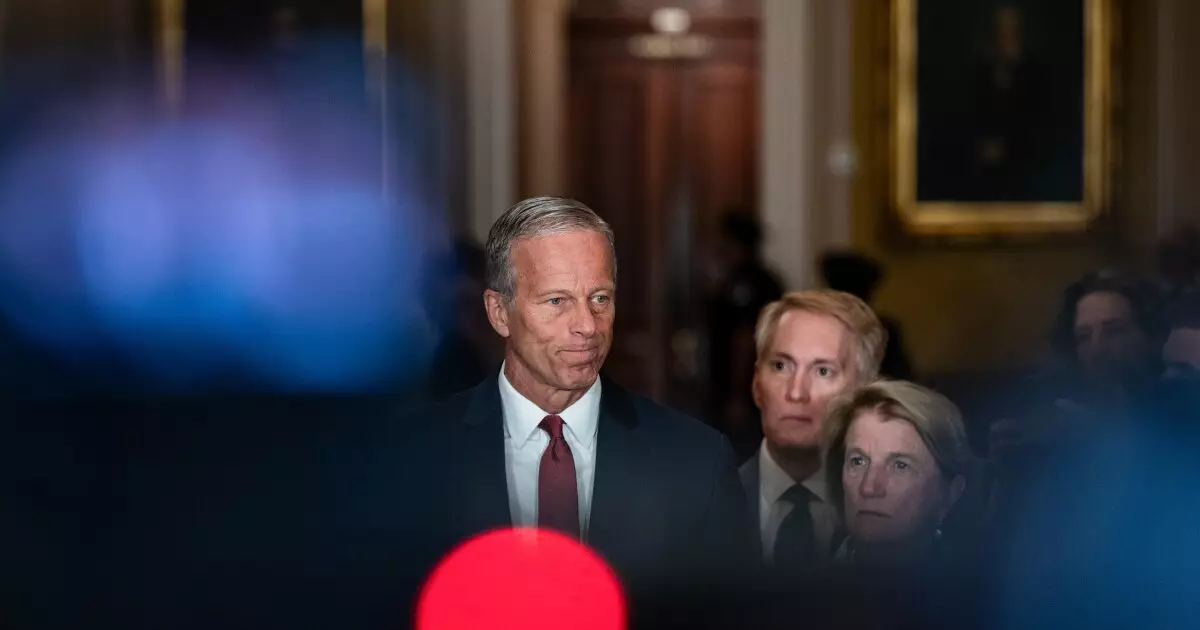Senate Republicans find themselves in a precarious position as they devise plans to allocate $15 billion to establish a relief fund aimed at safeguarding the financial stability of rural hospitals facing impending Medicaid cuts. This funding initiative emerges from a growing recognition that many rural healthcare facilities are teetering on the brink of collapse, primarily due to the proposed changes in funding within the Senate’s tax and spending bill. It’s a dilemma that transcends party lines — rural healthcare is a critical issue that can no longer afford to be politicized.
Healthcare in rural America is in dire straits. With the looming threat of significant Medicaid cuts, states like Kentucky, North Carolina, Iowa, and Oklahoma risk losing billions in medical coverage over the next decade. It is not merely a budgetary issue; it is a matter of life and death for countless individuals who depend on these facilities. A staggering 48% of rural hospitals operated at a financial loss in 2023, as reported by the American Hospital Association, highlighting the pressing need for financial intervention. The proposed relief fund, if implemented effectively, might offer a lifeline to these struggling institutions.
Internal Struggles Amidst Legislative Railroads
However, the Senate’s ambitious plans are somewhat hampered by internal dissent. Segments of the Republican Party express discontent regarding the proposed Medicaid cuts, which recently faced a setback when the Senate parliamentarian determined that many cost-saving measures were in violation of the Byrd Rule. This ruling demands that legislation be chiefly focused on budgetary matters and prohibits the inclusion of provisions intended for political maneuvering. For GOP leaders, this presents a dual challenge: ensuring that the relief fund garners bipartisan support while navigating the stringent demands of legislative protocol.
Senate Majority Leader John Thune’s demeanor during this turbulent phase is commendably pragmatic. He has opted against overriding Parliamentarian Elizabeth MacDonough’s rulings despite calls from hardline conservatives to do so. Thune’s strategy appears to be one of cautious optimism, framing the setbacks as mere “speed bumps” rather than insurmountable hurdles. Yet, with ambitious deadlines, such as the July 4 target for passing the bill, time is of the essence. As rumors circulate regarding delays in voting, uncertainty looms in both legislative halls and municipal bond markets.
The Impact on Financial Markets: A Troubling Forecast
As the Senate debates the nuances of Medicaid funding, investors remain jittery. Notably, the municipal bond market is apprehensive about the implications of potential tax exemptions returning to the table as the Republicans refine their approach to offsetting the cuts. With yields on the S&P Municipal Bond Hospital Index up at 4.44%, there is a palpable tension in the atmosphere; the financial ramifications may ripple across the healthcare sector if the proposed relief measures fail to materialize.
What is often overlooked in the macroeconomic considerations is the human element — the hospital workers, patients, and communities who stand to suffer the most from political standoffs. These financial anxieties are compounded by a broader discussion about the role of government in providing essential healthcare services. In a time where the urgency for change is unmistakable, gridlock only serves to exacerbate the challenges faced by rural facilities.
A Call for Pragmatic Solutions Over Political Posturing
Ultimately, the Senate Republicans need to prioritize constructive dialogue over divisive rhetoric to cultivate a plan that benefits rural hospitals efficiently and effectively. The proposed $15 billion relief fund, while ambitious, needs a strategic implementation plan that considers the unique needs of each state. A balanced allocation system that weighs a state’s rural population against its healthcare facility concentration is crucial. Adopting a bipartisan approach may also attract support from moderates and even some Democrats unhappy with deep cuts.
As the healthcare landscape continues to shift, legislators must resist the urge to engage in political theatrics. Instead, they need to channel their energy toward meaningful reforms that ensure not just the survival but the revitalization of rural healthcare systems across the nation. In a time of increasing division, the ability to work across aisles for the greater good has never been more necessary.


Leave a Reply